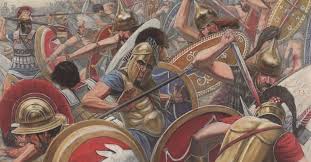Your basket is currently empty!
The Battle of the Allia
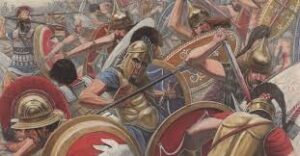
On July 19th, 390 BC (traditional date), a devastating battle took place between the Roman Republic and the Senone Gauls, led by Brennus, near the Allia River. This engagement resulted in a catastrophic defeat for the Romans, who were significantly outnumbered and outmaneuvered. The Roman army suffered heavy losses, leading to a widespread panic and the subsequent sack of Rome itself. The Gauls quickly advanced on the city, finding its gates open and largely undefended after the rout. This event, known as the Sack of Rome, left a deep psychological scar on the Roman psyche for centuries. It underscored the vulnerability of their burgeoning republic and led to significant military reforms. The memory of the Allia served as a powerful reminder for future Roman generals to never underestimate their enemies.
The Battle of Halidon Hill
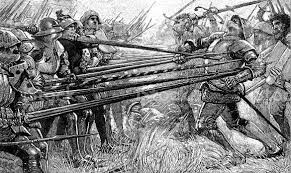
The Battle of Halidon Hill took place on July 19th, 1333, near Berwick-upon-Tweed, during the Second War of Scottish Independence. This decisive engagement saw the English forces, led by King Edward III, achieve a crushing victory over the Scottish army. The Scottish forces, under the command of Archibald Douglas, attempted to relieve the besieged town of Berwick. Edward III expertly positioned his archers on a hill, allowing them to inflict devastating casualties on the advancing Scots. The English longbow proved incredibly effective, disrupting the Scottish schiltrons before they could engage in close combat. The battle resulted in a massive loss of life for the Scots, with many prominent nobles among the fallen. This defeat allowed Edward III to capture Berwick and effectively brought Scotland under English control for a period. It was a significant moment in the long and often bloody Anglo-Scottish conflicts.
The Seneca Falls Convention Begins
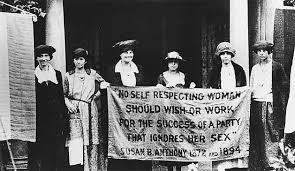
On July 19th, 1848, the Seneca Falls Convention, the first women’s rights convention in the United States, commenced in Seneca Falls, New York. Organized by Elizabeth Cady Stanton and Lucretia Mott, the convention aimed to discuss the social, civil, and religious conditions and rights of women. Approximately 300 people, including 40 men, attended the two-day event. The highlight of the convention was the presentation and adoption of the “Declaration of Sentiments,” a document modeled after the Declaration of Independence. This declaration outlined women’s grievances and demands, most notably the right to vote. The convention marked the formal beginning of the organized women’s suffrage movement in the United States. Although met with significant criticism, the Seneca Falls Convention laid crucial groundwork for future advancements in women’s rights.
The Sandinista Revolution Triumphs in Nicaragua
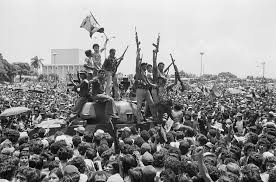
On July 19th, 1979, the Sandinista National Liberation Front (FSLN) successfully overthrew the dictatorial regime of Anastasio Somoza Debayle in Nicaragua. This event marked the culmination of years of guerrilla warfare and popular uprising against the Somoza family dynasty, which had ruled Nicaragua for over four decades. The Sandinistas, a socialist political party, had gained widespread support due to their promises of land reform, literacy campaigns, and improved social services. Somoza fled the country, bringing an end to his oppressive rule and ushering in a new era for Nicaragua. The Sandinista victory was seen as a significant win for revolutionary movements in Latin America during the Cold War. However, their rule soon faced challenges from the US-backed Contra rebels, leading to a prolonged and devastating civil conflict. The Sandinista Revolution remains a pivotal moment in Nicaraguan and Central American history.
The Moscow Summer Olympics Begin
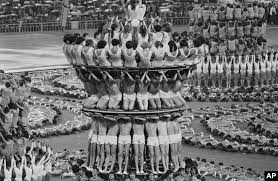
The XXII Olympiad, commonly known as the 1980 Summer Olympics, officially began on July 19th, 1980, in Moscow, Soviet Union. These Games were notable for the widespread boycott initiated by the United States and supported by over 60 other countries. The boycott was a protest against the 1979 Soviet invasion of Afghanistan. Despite the political controversy, the opening ceremony was a grand spectacle, showcasing Soviet culture and athletic prowess. Athletes from the participating nations competed across 21 sports, with the Soviet Union dominating the medal count. Many world and Olympic records were broken, demonstrating the high level of competition among the athletes present. However, the boycott significantly diminished the perceived legitimacy of the Games and impacted the quality of competition in several events. The Moscow Olympics remain a powerful example of how international politics can intersect with and influence global sporting events.
Russia Joins the World Trade Organization (WTO)
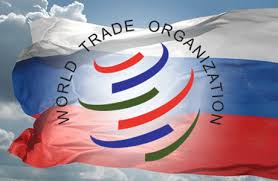
On July 19th, 2012, Russia formally became the 156th member of the World Trade Organization (WTO) after 18 years of negotiations. This long-anticipated accession marked a significant milestone for Russia’s economy and its integration into the global trading system. The negotiation process was complex, involving extensive reforms to Russia’s trade policies and legal framework. Membership in the WTO committed Russia to adhering to international trade rules and principles, including lower tariffs and increased market access. Supporters argued that WTO membership would boost Russia’s economic growth by attracting foreign investment and promoting competition. Critics, however, expressed concerns about the potential negative impacts on certain domestic industries and the effectiveness of enforcement mechanisms. Russia’s entry into the WTO was a recognition of its growing economic influence on the world stage. It also presented both opportunities and challenges for the country’s economic development and its relationship with other trading nations.

